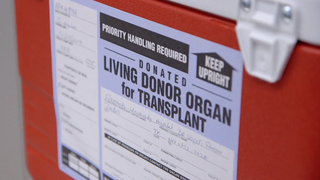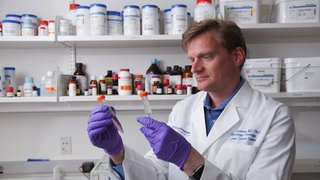Jared’s story: 4 kidney transplants in 30 years
April 17, 2019

In 1990, 19-year-old Jared Rumbo’s kidneys failed. He received a kidney transplant that year – the first of four he’d receive over the next three decades.
Jared’s first new kidney lasted five years. The second, which he received in 1995, did not work. In 1996, Jared’s younger sister volunteered as a living kidney donor. He resisted her offer for some time and begrudgingly accepted when his health took a turn for the worse. That kidney lasted 20 years, until 2016.
For the next two years, Jared underwent regular, ongoing dialysis sessions – an experience he describes as akin to a full-time job. “I was strapped to a dialysis machine three days a week,” Jared recalls. “There is only one option if you don’t do it, and it’s not a very good one.”
When Jared’s local hospital in Tyler, TX, dissolved its transplant program, UT Southwestern transplant doctors reached out. Our team worked with Jared’s local kidney doctors to provide the care he needed close to home. “It meant the world to me that the doctors came to me,” Jared says. “I would have had to stay at another hospital for two months until I got my transplant.”
Jared’s story is both hopeful and complex. Let’s begin with the elephant in the room: How can one patient qualify for four kidney transplants in a lifetime?
“In the 1990s and earlier, donor organs simply didn’t last as long as they do today. Our processes, approaches, and medications have improved substantially. As such, the need for repeated transplantations today is reduced.”
Parsia A. Vagefi, M.D.
What factors go into recipient selection?
When matching patients waiting on the kidney transplant list to available donor organs, we factor in a patient’s age, overall health, and urgency of need. Jared has struggled with kidney disease for most of his life. Aside from that, he is healthy, which makes him a good candidate for transplant procedures due to the likelihood of positive outcomes.
In the 1990s and earlier, donor organs simply didn’t last as long as they do today. Our processes, approaches, and medications have improved substantially. As such, the need for repeated transplantations is reduced. However, there is no threshold for the total number of organs a patient can receive in a lifetime
How to Save a Life ... or 8: The ABCs of Organ Donation
Did you know a single organ donor can save eight lives? Learn how as Parsia Vagefi, M.D., Chief of the Division of Surgical Transplantation for UT Southwestern, discusses the advances in organ transplants during our Facebook chat for National Donate Life Month.
Fourth transplantations are complex
I performed Jared’s fourth kidney transplant in September 2018. The procedure was complex – he had already had two kidneys placed in his right side and one in his left, so we had to find room to add the fourth. Additionally, his body had built up a high volume of antibodies over time, so finding effective anti-rejection drugs was challenging.
However, Jared won the figurative transplant lottery the fourth time around. His donor was a “perfect match,” meaning the kidney matched Jared’s body tissue remarkably closely. Perfect match kidneys are more likely to function well long term. As we had anticipated, the new kidney began to work right away after the procedure. Jared went home three days later with a normally functioning kidney.

Getting back to normal
Four months post-transplantation, Jared’s new kidney shows no sign of rejection. Twice a day, he takes a customized anti-rejection medication to prevent his body from shutting down the kidney.
Jared’s life is slowly returning to normal. He is eager to attend his children’s school events this spring and return to his career as a heavy equipment field mechanic. Through the highs and lows of his transplantation story, a determined and positive mindset is key. If you or a loved one are waiting on the kidney transplant list, Jared offers this sage advice: “Never give up. There are moments when it’s pretty tough, but it does get better.”
To make an appointment with a specialist at the UT Southwestern University Hospital Kidney and Liver Transplant Clinic, call 214-645-1919 or request an appointment.

We’re one of the world’s top academic medical centers, with a unique legacy of innovation in patient care and scientific discovery.

Patients can sign up to be a transplant donor with Donate Life or through their local Department of Motor Vehicles (DMV).











